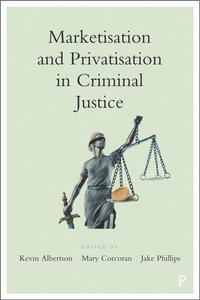Since 1997, the UK probation service, an integral component of criminal justice for over one hundred years, has been subject to a politically driven process of modernization and cultural transformation. This innovative book, a thorough revision of Exploring Modern Probation, explores this probation modernization by using social theories associated with Durkheim, Weber, Marx, and Foucault. Philip Whitehead combines this theoretical analysis with empirical research from interviews, which highlights challenges to, as well as support of, the politics of modernization. Unique in providing insights into what representatives of other organizations think about probation-the outside-looking-in perspective-this text will be a valuable resource for scholars and students of probation, criminology, criminal and social justice, and allied disciplines.
Industry Reviews
"A meticulous, succinct and extremely well written analysis of the probation services in the United Kingdom..." European Journal of Probation (about first edition)
"The book makes an excellent contribution to the theoretical imagination in probation ... a provocative and stimulating read... Transforming Probation reconnects the reader to the heritage and value base of probation, which is absent in New Public Management, Payment by Results and the pitfalls of inhumane, depersonalised targets in the mixed economy of provision for people on probation." Probation Journal
"During the past twenty years or so through a process involving missed opportunities, misguided policies and political posturing successive governments have almost squeezed the humanitarian life out of the Probation Service: it lingers still. Although, Philip Whitehead argues in this book that the humanitarian role of the Service will not survive, those of us who disagree know that if it is to survive in some form that benefits society by contributing to the rehabilitation of those people who offend, a thorough and critical understanding of that process is crucial. No-one is better qualified to deliver that understanding than Philip Whitehead. Not only has he worked within the Service throughout this period but he has shown in his many publications an acute understanding of the history of probation. This book promises to be both the definitive account of its recent past and the critically challenging one that is needed." Maurice Vanstone, Emeritus Professor of Criminology, Swansea University
























